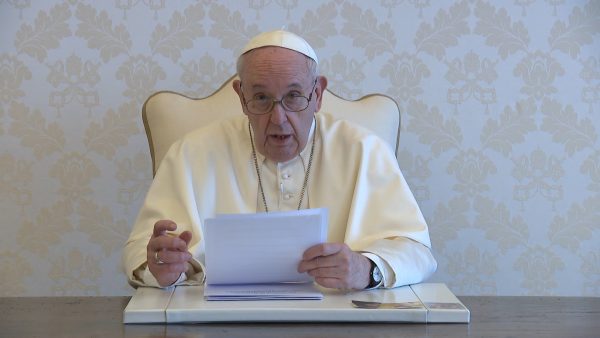
WINDSOR TERRACE — Christians together can change the world. That was the message Pope Francis gave June 9 to Catholic leaders and evangelical and pentecostal pastors gathered for this year’s John 17 retreat, encouraging them to continue on a path of unity.
“Together in love we Christians can change the world, we can change ourselves because God is love,” said Pope Francis in a video message. “I urge you to continue walking together, sharing life and fraternal love.”
Some 39 people attended this year’s John 17 retreat, held June 8-9 at St. Joseph’s Seminary in Yonkers, N.Y. The retreat is part of the John 17 movement that works to foster fellowship between Catholics, Protestants, Orthodox, Evangelicals, and Pentecostals.
The movement’s name comes from John 17:21, which reads: “Father make them one as you and I are one that the world that sent me.”
Pope Francis called the retreat in particular “a new path for reconciliation of Christians” in his video message.
“John 17 movement is about the love of those who around the table having a cappuccino, having a lunch or enjoying ice cream, discover brothers and sisters, not because of color, nationality, origin, or the various ways in which they live their faith, but as children of the same father,” Pope Francis said.
“And also, even if there is no table, even if there is no cappuccino, even if there is no ice cream, even if there is no coffee because there is poverty and war, we are also brothers and sisters and we have to say it to each other.”
Catholic leaders at this year’s retreat were Cardinal Joseph Tobin of Newark, Auxiliary Bishop Eduardo Nevares of Phoenix, Auxiliary Bishop Peter Smith of Portland, and Auxiliary Bishop James Massa of Brooklyn, who is the rector of St. Joseph’s Seminary.
In a keynote presentation, Cardinal Tobin quoted Pope Saint Paul VI and the virtues he said dialogue requires: clarity, meekness, confidence, and prudence. He cited them to say that as pastors and church leaders those virtues should factor into and shape the way they engage one another, according to Bishop Massa.
“If we’re able to model that for our people, then Christians are going to be more disposed to drawing closer and closer together in recognizing one another as brothers and sisters in Christ,” Bishop Massa said.
Bishop Smith was struck by the diversity of this year’s conference, of those who are represented, and the “increasingly free conversations” that took place. He also recognizes the continued focus on relational ecumenism — something that Pope Francis has long emphasized.
“Relationships build these things when you get to know people when they’re not just them and us. When they’re not just a caricature in your mind or their mind,” Bishop Smith said. “When you begin to have those relationships you begin to see one another as brothers and sisters in Christ.”
Both Bishop Smith and Bishop Massa also noted the importance of this year’s conference in light of growing secularism and divisions in the country.
“That it’s happening at a Catholic seminary is also important given the trends in American society right now,” Bishop Massa said. “Christians of all denominations are being understood as a minority community and because of the challenges we face and we need to draw closer together.”
Bishop Smith said he believes that at a time when there’s increasing divisiveness in society and in the church, people have more in common than they realize, but choose to place an emphasis on certain issues important to them.
“The church has a role to play because when people see that Christians can be unified or have that sort of relational unity with one another when they see the relational unity, we start to begin to fulfill that New Testament and, in junction, see how they love one another,” Bishop Smith said.
